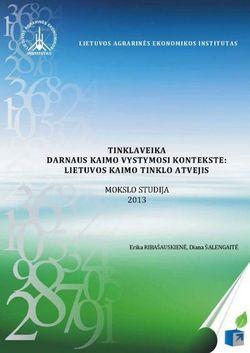
The main provisions of a new long-term society ideology of sustainable development have been defined during the Rio de Janeiro Summit in 1992. Concept of sustainable rural development has been developed in response to the two prevailing rural development paradigms - agro-industrial and post-industrial. The core idea of this concept is that the protection of the environment as well as economic and social development must go hand in hand and reinforce each other.
Due to the basic challenge of sustainable development which involve integration of different actions as well as sectorial integration, applying holistic approach and overcoming existing barriers between disciplines, it has become a serious test for policy-makers and contemporary management generally, where spatial and functional differentiation disperse the ability to deal effectively with the problems among different sets of actors, all with specialized tasks and limited resources and competence. Government has become increasingly dependent on cooperation and mobilization of common resources, necessary to ensure sustainable development, but owned by actors from outside the hierarchical control. In parallel implementation of fundamental - social, economic and environmental - objectives of sustainable development has become dependent on the effectiveness of institutional arrangements. These dependences led to the emergence of policy networks as a new form of government, differing from traditional governing by market and hierarchy.
Lithuania is lagging behind the West European countries according to the level of rural sustainable development. It is therefore necessary to find ways to make networking an effective instrument for achieving strategic objectives of the country. In addition, given the fact that in Europe and especially in Lithuania just the beginning of the use of networks in public policy is being observed, it is necessary to regularly review and evaluate the experience of network appliance in management and development.
The scientific problem. Until recently, the conditions under which networking is being effectively applied received very little attention. The appliance of networking, oriented to rural sustainable development, in Lithuania has not been yet assessed by local researchers, although importance of it for rural sustainability was widely recognized. In addition, confusing variety of the policy network concepts and definitions in both national and EU policy level studies demonstrates a need to clearly define policy networks and networking concepts.
The aim of the paper is to evaluate the appliance of networking for sustainable rural development in the case of Lithuanian Rural Network.
Evaluation of Lithuanian Rural Network appliance for sustainable rural development was conducted using qualitative and quantitative research methods: a systematic literature and document analysis and synthesis as well as structured interviews with the members of the Network. The data from the interviews were processed using the SPSS 16.0 statistical program and Microsoft Office Excel program. The data analysis was performed using such methods as descriptive statistics, logical analysis and graphical visualization.
In the study concepts and features of policy networks and networking were examined; theoretical justification for the appliance of networking for sustainable rural development was presented; methodology for the evaluation of the appliance of networking in the case of policy networks was designed and the resulting assessment of networking in the case of Lithuanian Rural Network was carried out. Conclusions and recommendations were drawn.
Keywords: Lithuanian Rural Network, networking, policy network, sustainable rural development.
Ribašauskienė, E.; Šalengaitė, D. 2013.Tinklaveika darnaus kaimo vystymosi kontekste: Lietuvos kaimo tinklo atvejis : mokslo studija [elektroninis išteklius]. Vilnius: Lietuvos agrarinės ekonomikos institutas. 59 p. ISBN 9789955481386.
